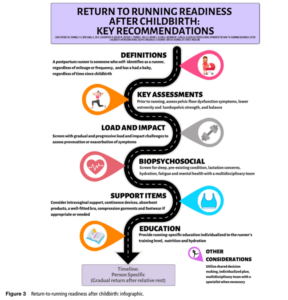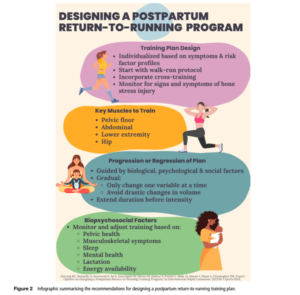This is a question we hear often at Total Physiotherapy and the answer is that the timeline for postpartum women to return to running looks different for everyone.
Evidence on returning to running after having a baby
The latest evidence on returning to running outlines several components that should be considered when assessing a woman’s readiness to return to running. This process is dependent on a number of factors and is highly individualised based on the following areas:
- Key assessments: Following a period of rest to allow complete healing of any birth injuries, key assessments should be conducted before returning to running. These include assessments for pelvic floor health; lower limb, hip and core strength and stability. This allows us to assess the relative risk of common symptoms that may occur when resuming running after having a baby. These may be musculoskeletal symptoms such as muscle or joint discomfort particularly in the low back, pelvis, hips or knees. Or they could be related to the pelvic floor such as incontinence (leakage of urine), prolapse (heaviness or bulge in the vaginal area) or lack of control of the bowels or wind.
- Load and impact screening: A series of gradual and progressive load and impact challenges are used to assess provocation of symptoms. The postpartum runner should be able to complete the screening tasks without musculoskeletal or pelvic health symptoms before initiating running to reduce the injury risk during impact exercise.
- Biopsychosocial factors: Several factors such as sleep, mental health, lactation, energy availability in addition to pelvic health and musculoskeletal symptoms should be monitored. These factors will influence one’s training capacity and ability to progress.
- Support items: We know that running is important to the physical and mental health of many women. Rather than say you can’t run until you are symptom free, for those with prolapse or incontinence symptoms we may suggest intravaginal support devices such as pessaries. Adequate breast support is also important and compression garments may assist comfort. Feet can change shape or even size after pregnancy so ensuring the correct footwear for your running goals is important.
- Education: Seeking information from an expert in postpartum recovery and running is important. Setting running goals will relate to prior running habits, both throughout pregnancy and before pregnancy. Education around current training capacity, goals and training preferences will also ensure a safe return is achieved.
- Multidisciplinary team: Collaboration amongst health care professionals including women’s health physiotherapists, exercise physiologists and running coaches is essential to provide comprehensive care.
How physiotherapy can help you return to running after having a baby
At Total Physiotherapy, we have an expert and passionate team who can guide your return to running. We have four women’s health physiotherapists who conduct postnatal assessments to pick up any potential problems with the pelvic floor muscles, the abdominal muscles or the low back and pelvic girdle.
They can identify any areas of load and impact that need work. When it comes to a specific return to run plan, our exercise physiologist, Laura Starc, can work with you to ensure you have the necessary strength, technique and graded programme to achieve a safe and successful return to running activities.
Source: (Christopher et al., 2023)
What is included in a return-to-running training program?
To safely return to running, the multidisciplinary team can provide postpartum women with a program which includes:
- Individualised Exercise Prescription: Tailoring the training programme to the specific needs, abilities, and symptoms of each postpartum woman.
- Gradual Progression: A gradual increase in impact activity should be conducted through including walk-run protocols and cross training (swimming, cycling). To minimise the risk of injury and adverse symptoms, program progression should be gradual, with changes to duration superseding changes to intensity. If symptoms arise or baseline symptoms worsen, running volume should be temporarily decreased.
- Strength Training: Incorporating targeted muscle strengthening exercises for trunk and lower extremity muscles to support the return to running.
- Monitoring Biopsychosocial Factors: Regularly assessing and monitoring factors such as sleep, mental health, lactation, energy availability, in addition to pelvic health, and musculoskeletal symptoms to guide adjustments in the training programme.
Source: (Deering et al., 2024)
So if you have recently (or not so recently) had a baby and you would like to return to running, here are the steps you should take:
- See your women’s health physiotherapist for an assessment of pelvic floor, abdominal muscles and low back/pelvic girdle. We can also screen the initial load and impact challenges needed for running. We usually suggest you do this postnatal assessment any time from 6 weeks. Occasionally women recover more quickly from the birth and have had a good level of running fitness prior to and through the pregnancy. They may choose to see us around 4 weeks to assess their readiness to run and how to prepare if not quite ready.
- See Laura our exercise physiologist to receive expert advice on formulating your return to run programme.
- Contact us on 9907 0321 or book online here to begin your return to running.
Authors: Laura Starc, Accredited Exercise Physiologist and Louise Henderson, APA Titled Physiotherapist (Continence and Women’s Health).
References
-
Christopher, S. M., Donnelly, G., Brockwell, E., Bo, K., Davenport, M. H., De Vivo, M., … & Deering, R. E. (2023). Clinical and exercise professional opinion of return-to-running readiness after childbirth: an international Delphi study and consensus statement. British Journal of Sports Medicine. https://bjsm.bmj.com/content/early/2023/12/26/bjsports-2023-107489.abstract?casa_token=BjiWVXZuy_YAAAAA:1mtV8GGwOFjnYz2AIyGUaJBFWiki4JdomSUQp7k-lGW8BPEg8UX9PII8CZhM8ZIlfar1xDAXJLY
-
Deering, R. E., Donnelly, G. M., Brockwell, E., Bo, K., Davenport, M. H., De Vivo, M., … & Christopher, S. M. (2024). Clinical and exercise professional opinion on designing a postpartum return-to-running training programme: an international Delphi study and consensus statement. British Journal of Sports Medicine. https://bjsm.bmj.com/content/early/2024/01/08/bjsports-2023-107490.abstract?casa_token=MfPLJYWpGi8AAAAA:NmZqzkFfXOo_8KxG7pfLkTEJLFaxcOueqHUXDJQ_YKbc33Nogb-ClKsZe–H_NgG9Tg3gPGY_xw




